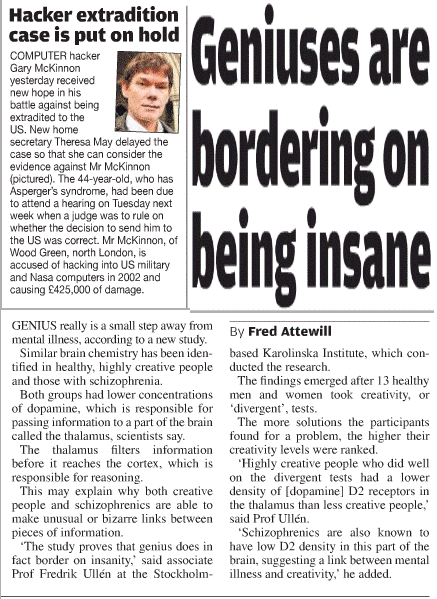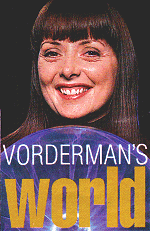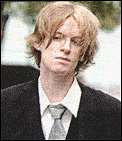Letter to City Life
People are quick to characterise the "sad" computer nerd,but who are
they really?
Dear City Life,
I am writing to you as an advocate of a much maligned and misunderstood minority.
Throughout our lives we are forced to endure the insult of perjoritive terms
of abuse which denigrate and caricature our kind. Consequently I was very
disappointed to see one such term used in one of your own articles. I am
referring of course to your use of the word 'nerd' in RA Page's article on
the Moonfish organisation.
There exists in our society a small minority of individuals
with a natural gift for the kind of abstract rational concepts which leave
the average person baffled, bemused or simply bored. We are generally given
a scientific education throughout which many of us remain in the academic
top percentile. We choose to make our living in science, engineering or
information technology. Have we not already suffered enough?
In allowing the use of such terms in your pages you are
perpetuating a culture of contempt towards me
and my kind, which would be unacceptable were it to be directed against any
other minority; an episode of Channel Four's 'This Life' series,for example
once referred to a scientist of the stature of Christian Doppler as
'some geek', without attracting adverse comment.
Without science and technology there would be no industrial
civilisation that means no electric pop music, theatres, museums and other
events celebrated in your magazine. We require the efforts of those who make
life possible before we can have the things that make it worth living. Surely
these people deserve the same respect as everyone else.
For your information the original meaning of the word 'geek'
was a physically disabled person displayed as an attraction in a fairground
sideshow. 'Nerd' is a contraction of 'Ne'r do well' an odd epithet to apply
to the richest man in the world.
It is common knowledge that those of us trained in the sciences
have no sense of humour and are completely devoid of human feelings, so I
cannot claim to be offended by your article. However, given that it appears
in a publication so self -consciously proud of its politically correct editorial
policy, I would like to object to the logical
inconsistency.
| WAV 288K |
Stereotyping errors |
| I tuned in to Attachments (Tuesdays
BBC2) because of the sheer brilliance of This Life, but this is a
letdown. I'm a writer myself, and I would be ashamed to let my name appear
against something so poorly researched. I have also worked in several computer software environments over 15 years, and I never once encountered the sort of pathetic, juvenile, nerdy computer programmer stereotypes portrayed. The formula is still good - gritty, realistic dialogue, tense situations, interesting relationships. Why spoil the effect by including two cartoon characters? Programmers are not a form of sad, sexually frustrated, human debris, and these two would not last a week in an average computer centre. Chris Rigby Worcester [RT Letters 21-27 October 2000] |
LOVESICK HACKER "CRIPPLED PORT"
A lovesick hacker caused a 'potentially
catastrophic' electronic meltdown at America's biggest port in a bungled
attack on a fellow chatroom user's PC,a court heard yesterday. Aaron Caffrey,who
had an American girlfriend, wanted to avenge anti-US remarks made by a South
African user called Bokkie,it was alleged. But the bug allegedly sent by
the 19-year old Briton disabled computers in Huston,Texas,freezing crucial
data including figures needed for navigation. |
 |
|
 |
We like to think of ourselves as a nation of inventors
- but do we as a nation value
inventiveness? This week Swansea hosts the International Conference on Technology at which the Prince of Wales Award for Innovation will he announced. "So what?" I hear you cry. "So the future of Britain," I shout in reply. Technology is what we make and what we sell if we're lucky. Is it merely coincidence that our most economically successful days were when we had pride in our inventiveness?
Look back in the history books and
you will see rows of great British inventors Trevithick, Cayley, Babbage,
Kelvin, Bell, Parsons, Ferranti. Nowadays we celebrate thespians, footballers
and boys in the City for making a quick buck.
|
| Today only one in a thousand ideas makes it
commercially because, as
Prince
Charles puts it, "there is still a lot of scepticism about British
innovation". There is another reason why we don't value our inventors - in
terms of technology we are ill-educated snobs. We think it far better to
know a few lines from Shakespeare than understanding what a
RAM is and how it works. Does it ever occur to
anyone that we ought to know both?
In the next two decades the world will change out of all
recognition and the power base will go where the money goes, and the money
will go where technology and inventiveness thrive. Please make sure it's
here; give Britain a heritage for tomorrow. |
|



